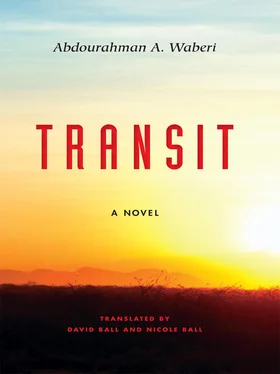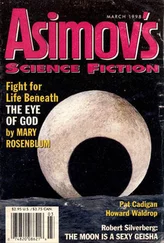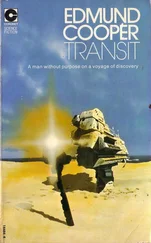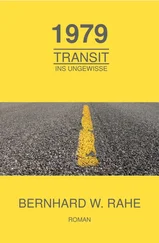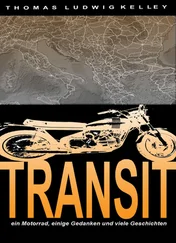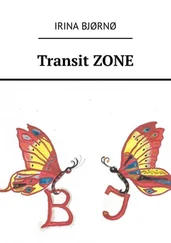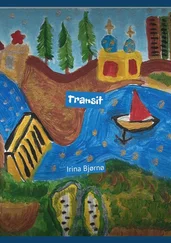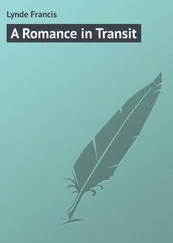Abdourahman Waberi - Transit
Здесь есть возможность читать онлайн «Abdourahman Waberi - Transit» весь текст электронной книги совершенно бесплатно (целиком полную версию без сокращений). В некоторых случаях можно слушать аудио, скачать через торрент в формате fb2 и присутствует краткое содержание. Год выпуска: 0101, Издательство: Indiana University Press, Жанр: Современная проза, на английском языке. Описание произведения, (предисловие) а так же отзывы посетителей доступны на портале библиотеки ЛибКат.
- Название:Transit
- Автор:
- Издательство:Indiana University Press
- Жанр:
- Год:0101
- ISBN:нет данных
- Рейтинг книги:3 / 5. Голосов: 1
-
Избранное:Добавить в избранное
- Отзывы:
-
Ваша оценка:
- 60
- 1
- 2
- 3
- 4
- 5
Transit: краткое содержание, описание и аннотация
Предлагаем к чтению аннотацию, описание, краткое содержание или предисловие (зависит от того, что написал сам автор книги «Transit»). Если вы не нашли необходимую информацию о книге — напишите в комментариях, мы постараемся отыскать её.
Transit — читать онлайн бесплатно полную книгу (весь текст) целиком
Ниже представлен текст книги, разбитый по страницам. Система сохранения места последней прочитанной страницы, позволяет с удобством читать онлайн бесплатно книгу «Transit», без необходимости каждый раз заново искать на чём Вы остановились. Поставьте закладку, и сможете в любой момент перейти на страницу, на которой закончили чтение.
Интервал:
Закладка:
Next morning the ambassador came back with another shirt but same tie. He said like a boss to the three other men: you, you can leave, I have received assurance from the authorities. The others, they didn't stand up; they were too KO. Then, it our turn. You and your son, I can at a pinch —he repeated that pinch-there three times — get you on tonight's flight. I'm going to sign a permit for urgent repatriation; you'll try to handle your administrative formalities once you're in Paris. No residency visa; don't count on it. That's all I can do for you. As for the investigation, that will wait until your country regains its sanity. And he left without saying good-bye.
EPILOGUE
To tell is suffering. To be silent is suffering, too.
— AESCHYLUSHARBI
TODAY, EXILE is making eyes at everybody: individuals young and old, entire families, and whole regions have thrown themselves onto the roads with their pockets full of hope and fear spurring them on. They go wherever the wind may take them, with filth and rotting corpses for company. They get lost in the labyrinth of bad luck, and hurricanes fling them deep into dungeons, into the dark pit of ordeals, and even into countries they never heard of in their former lives, like Finland, Iceland, or Alaska. These are people who have often forgotten their age and changed names many times; their inner clock stopped the day they left. Their brains took flight before their muscles; they have wandered from a makeshift shelter to an airlock the color of night. Borders, oceans, laws, and police cannot stem this human flood. And even the shaved heads of old, worried Europe, the neo-Nazi torchbearers, the arsonists of shelters for stateless foreigners can do nothing to contain them. And here they are, my brothers in misfortune, dazed and frightened in the cold climate, terrified by the administrative mess inherent in the European paradise, my brothers discovering some legal refinement their colonial education had never touched on, like in Switzerland. They had left their not-so-ancient cities to find themselves stuck between un-Christian charity, liberal Jesuitism, Protestant deceit, and Helvetic slyness, not to mention the devious lacework made in Strasbourg and Brussels. Nothing to destroy our timid hopes — the hopes of the humble — nothing to scar our dreams: asylum is the azure sky, the fertile horizon. It's the end of hunger that hollows the cheeks and makes the eyes flare. Dryness to the bone. Watch out, you're falling into cheap lyricism, whispers a little mocking voice inside me. No need to be a doctor to see that our thinness isn't fake. Nothing to do with the false paleness of models with the buttocks and thighs of a grasshopper, or the health of an outdoor daredevil, or the thin frame of the workers of the high seas, the walnut tan of soldiers of the Alpine summits, the raging hunger of the mountain specialists of the Tour de France, the energy of cycling road-eaters and the hollowed-out torso of Sunday Poulidors. 1That's the swaggering stuff spread all over the newspapers I pick up off the low tables and seats in Roissy.
As for us, we describe ourselves as present absentees, weak-kneed nobodies who have lots of things to say about their previous life, but the traffic jam of words in our throats makes us more silent than a regiment of Buddhist monks. We remain prisoners of the river of words that flow on in meanders: in what language should we light the fire of confession? What we could tell you would surely make you lose all taste for sleep and the desire to grow fat from idleness at home. What we could tell you would appeal as much to your heart as to your conscience. Deaf-mutes now, we drag around our diminished silhouettes in silence, so lost in solitude that we can't talk any more and no longer know how. We are grains of sand washed up onto someone else's desert, and that's what we'll always remain. No one running after us and no sign of hospitality in sight. We no longer even have the mats we would sleep on once the little loincloth separating the children's corner from the parents’ was lowered. We've left our stories, our melodies, our books of magic, and our ancestors behind. The danger awaiting us is this: if you live only in the present, you're likely to be buried with the present.
I'll remember for a long time that group of refugees storming a commercial plane in Ambouli airport. Like a swarm of locusts, they cluster together in the middle of the tarmac, then, on a sign one of them gives from who knows where, they rush up the gangway. Girls in hijabs, middle-aged women in chadors leaving a long trail of heady perfume behind them, boys in ill-matched suits, mothers hobbled by tight dresses, patriarchs lost in the jumble of orders and counter-orders. The neat-looking female flight attendants are completely at a loss. Their definitive gestures and their suddenly authoritarian tones are signs of impotence. No sooner are they seated than the new arrivals get up, block the aisles, come back to sit down, get up again. Order and measure are sent off reeling; they change places, change seats. They transfer an uncle with a bad headache to the other end of the Airbus. They call out to a sister, a cousin, a neighbor they think they recognize. They complain aloud and have absolutely no clue how uncomfortable the people around them feel, nor do they see the dark looks sent their way since they've arrived. The European passengers who boarded the plane at Saint-Denis de la Réunion hunch down in their seats and let the storm pass. But they don't notice. They come from Mombasa; they fled Mogadishu. They might have been Tamils, Sudanese, Afghans, Kurds, Albanians, or Bosnians. They are the millions of humans with a number from the United Nations High Commission for Refugees and a rationing card. They are the peoples in motion through the shrinking world.
Who will extend their hospitality to us like lovely Calypso, who put her milky arms around an Odysseus in rags? Who will protect us as the eyelid protects the eye? Many of us just hope to get into a shelter, a humanitarian emergency reception center — oh yes, that's what they're called. To cross the tunnel under the Channel, with our family if at all possible, with or without the agreement of the men who offer to make the crossing easier — for money — in order to find ourselves in England without being able to stammer a yes or a no thank you. The first natives of the country we glimpsed at the airport counter were already frowning with animosity. Our last fantasies dissolved. All we could see of them was their closed faces and the accusing hooked index finger. I hear that special words are traveling from group to group, transit from mouth to mouth. England, which was only a word like any other, a fantasy like any other, a distant echo of that longed-for Eldorado, is stirring in every mouth. That word is about to become an open-sesame, a common fate. I remember now that Joao, an Angolan intellectual I met in the airport, was loudly repeating the credo and chorus of the national anthems of big countries. He certainly was shouting his head off, belching out an unrecognizable mixture in every direction: “Libertade o morte…Deutschland, Deutschland über alles…God save the Queen…In God we trust…True North strong and proud…Allonz'enfants de la patrieee…”
Wait. Still a few more days, a few more weeks. Maybe a few months, adds the small voice, casually pointing out to me that my own little exile is nothing compared to the crossing of the Red Sea by the sons of Moses over five thousand years ago. Tormented by sleep, we turn over in our mouths, again and again, what happened yesterday and the day before; human memory is an eternal support that enables what usually withers away, forgotten and lost in the limbo of the present, to come back to life. Nothing has gotten any clearer except the renewed mystery of waiting; our existence is a one-eyed amphibious kaleidoscope. I must get slick enough to go through walls, as my new condition demands. To survive melancholy and thumb my nose at emptiness, from time to time I reread my virtual travel journal, which is necessarily cerebral. It's a jumble of dog-eared pages, childish scribbling (I've even kept some drawings Abdo-Julien made when he was around six, a bookmark in the book of memory), bay leaves, cactus and aloes flowers stuck to the covers, family photos, and many other trivial objects, like that seashell I picked up one day on White Sand Beach in Tadjoura. I hang on to this wavering, inaudible, invisible next-to-nothing, already vanished. To forget for a moment the Arctic men with no sense of humor who will eventually take down our sworn statements. And read, keep reading. Do not break down; do not cry in front of the whole world. At any rate, my culture does not predispose me to cry. Especially not a man — and what's more, an ex-father. Hold back my tears, and read, read, read. Keep reading, in every situation, everywhere. Read the way other people count sheep before going to sleep. I can see myself again confined in the little room of the central police station. I concentrate on all the sounds around me. Very quickly, I was pushing away the shouts, the blows, the crying, and the snores. I trained my ear to capture the slightest sounds in the distance. And that miraculous bit of fishing saved me from depression. I had found the only pleasant way of animating the scene: listening to the monotonous cooing of the pigeons. Their hoarse song, repeated like a drunkard's speech, came to me rhythmically and took me out of the condition I was in. Luckily a bird would fly off from time to time, flapping its wings as if to bring oxygen to my ears and my mind. That's how I held out for weeks and months. I had learned the ABCS of my new state: silence, exile, and cunning.
Читать дальшеИнтервал:
Закладка:
Похожие книги на «Transit»
Представляем Вашему вниманию похожие книги на «Transit» списком для выбора. Мы отобрали схожую по названию и смыслу литературу в надежде предоставить читателям больше вариантов отыскать новые, интересные, ещё непрочитанные произведения.
Обсуждение, отзывы о книге «Transit» и просто собственные мнения читателей. Оставьте ваши комментарии, напишите, что Вы думаете о произведении, его смысле или главных героях. Укажите что конкретно понравилось, а что нет, и почему Вы так считаете.
